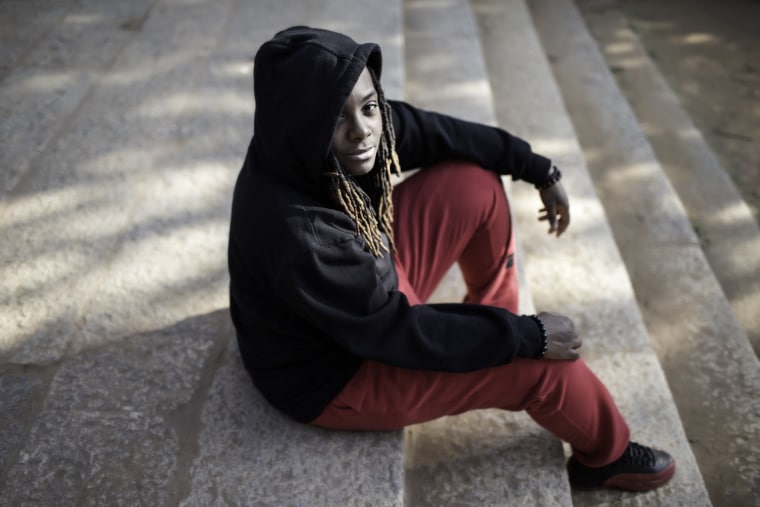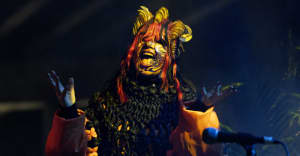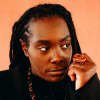Jlin’s new soundtrack conquers ballet and the human genome
The vital electronic artist deserves a vacation, but she’ll never stop being bold.
 Jlin
Photo by Mahdumita Nandi
Jlin
Photo by Mahdumita Nandi
Jlin’s on a creative warpath. That statement would be true if the Gary, Indiana artist chose to only release her sophomore album Black Origami this year. That record was universally celebrated upon its release in May for the progressive, supernatural permutations of footwork — the sound seems to contain a code commanding the listener to process the music at a slower rate, even while the record’s BPM stays close to 160. But it was in the midst of promoting Black Origami that Jlin (real name Jerrilynn Patton) was working on continuing her streak with the soundtrack to Autobiography, a new choreographed work by Wayne McGregor, a resident choreographer at London's Royal Ballet.
Autobiography is inspired by McGregor’s own DNA. There’s no bigger subject than the data containing the universe of every individual, but Jlin is a voracious learner, a detail-oriented artist, and dives deep within herself in every creation, making her the ideal candidate for such a piece (it premiered on October 4 in London). Her research for Autobiography included the book The Gene by Siddhartha Mukherjee, and over the phone, she tells me about the creative space that the subject matter — literally the stuff of humanity — helped create. “For two tracks, ‘Carbon 12’ and ‘Blue Eye,’ I felt drained when I was done,” she said. “I'm always fine with being tired after finishing something, but these were different.”
Jlin says that she rejects the idea of boldness as “a one-dimensional thing,” but it doesn’t come without cost. The FADER spoke with her about where she went inside of herself and along with McGregor to create the music of Autobiography.
What’s your personal history with ballet?
My mom had introduced me to the School of Alvin Ailey when I was about six. [Also] Judith Moore, she had danced with this piece called “Wade in the Water.” It grabbed me. I wanted to create for Alvin Ailey. That's where it started with me.
What was the process like of composing this music compared to your studio albums?
Some of the scores are 119 bpm, which is not me at all. I have some scores that were 100 bpm [and even] slower than that. There are some tracks that you can never, if somebody told you, that was Jlin, you probably wouldn't believe it. Wayne totally let me experiment with what he knew I could do.
Was Wayne sending you videos of dancers for you to compose to?
No, Wayne would send me words, but not many words. He knows me quite well creatively — he throws out something and then I'll snatch it and run with it, and vice versa. That's how we experiment. He's just really open to how I feel. That's really important for me.
It seems like you’re a great listener, which would help explain how you’ve done so many interesting collaborations throughout your career.
I listen and I watch. Your senses are important but you also have to operate supposing one of them wasn't there. [Then], the dynamic changes because the sound changes. If you're using your ears all the time, all the time, all time, what about when you're feeling the vibration because you're watching something? That's totally different than you listening to something but now you're seeing it.
You said in a previous interview that before you even hit the creative spot, you need to deal with the personal.
Yeah. I cannot authentically create unless I deal with personal me, which is why when I make a song, it can drain me because I'm digging from my core of myself. That is more important than the person hearing the song. If the song is not authentic, what are you doing it for? Out of six songs on the radio, five of them sound the same. Hell, they've probably got the same producer, more than likely. Trendy is easy. Digging from your core is not. In order to dig from yourself, then you have to face yourself and facing yourself comes before the creative process.
For this particular work, what kind of personal stuff were you forced to face?
Balance [issues were] one, time being another. My stress, I have anxiety. Hell, I don't think you can live in this world and not have anxiety. There were things that I was not liking about myself that I was having to deal with personally, just old things coming up from the past that I wasn't happy with. I had to deal with those things, [and] it comes out in my music. There are times when I sound like I'm just completely lashing out, well, I am. Really, I am. I think it's important for your audience to hear that, because it's a realistic experience. Some people are like, Man, that song is so intense. Yeah, you're listening to my core. I'm in debt internally. I might not be externally, but internally, yeah. You're pulling something from yourself.
I have a thing where I say, in order to be comfortable, you have to be willing to be uncomfortable. I live that. That's how I produce all of my work. That's kind of how those things, they come about, and they develop and just watching something unfold can be very uncomfortable. Especially because you're naked in front of people, over half are ready to attack you anyway. On top of the fact that I would say 98% of the people of the world are very fickle, and then social media does not help.
Social media was important to your career beginnings. Do you think you would have still emerged in such a vastly different landscape?
I could have done it, but I think I would have come out differently. I would not have been as bold as I am, or I would have been bolder. One extreme or the other. [But] you have to feel a thing. Bruce Lee, his theory of knowing when to contract and when to expand, I think that's so important. That's what I try to focus on musically.
There are times when I sound like I’m just completely lashing out, well, I am. Really, I am. I think it’s important for your audience to hear that.
Who are some other figures who inspired Autobiography?
Probably the biggest one for me is Henrietta Lacks [an African-American woman whose cancer cells were harvested, leading to many medical breakthroughs]. It’s an awful story. You've been stolen, and your family hasn't been compensated. How many times have black people in general just experienced that?
Did you have any feelings about bringing your sound to the overwhelmingly white space of ballet?
That actually didn't even cross my mind. I wasn't worried about that. This is me, [and] Wayne was very receptive to that. He is also a person [who] busts right through the spine of tradition. That can bother people, to say it mildly. There's nothing wrong with tradition but you can merge tradition and brand new, because they’re family. Society separated them. When you label something because you need a reference point or description, whatever, I get that. It's a totally different thing when you try to pigeonhole something. That's control. Now you're trying to squeeze the bird, and you should let the bird just lie, if he wants to land in your hand, let the bird land in your hand. Because the bird landed in your hand does not mean you squeeze it, because you don't want to let it go.
Are you going to do an official release of the soundtrack?
I'm sure at some point. We're taking one hurdle at a time. [laughs]


